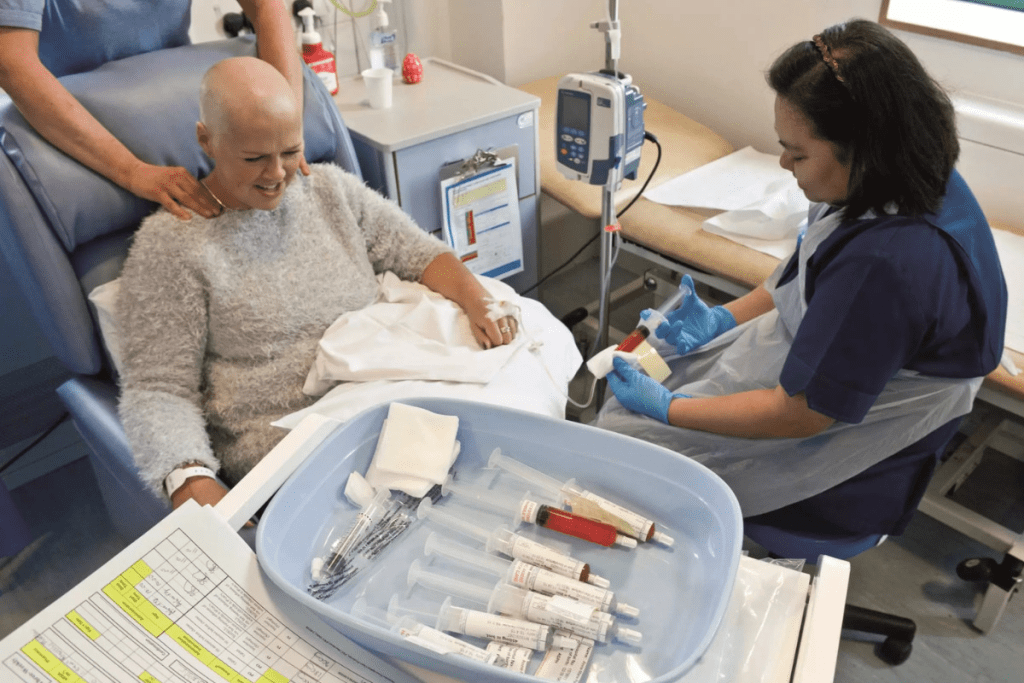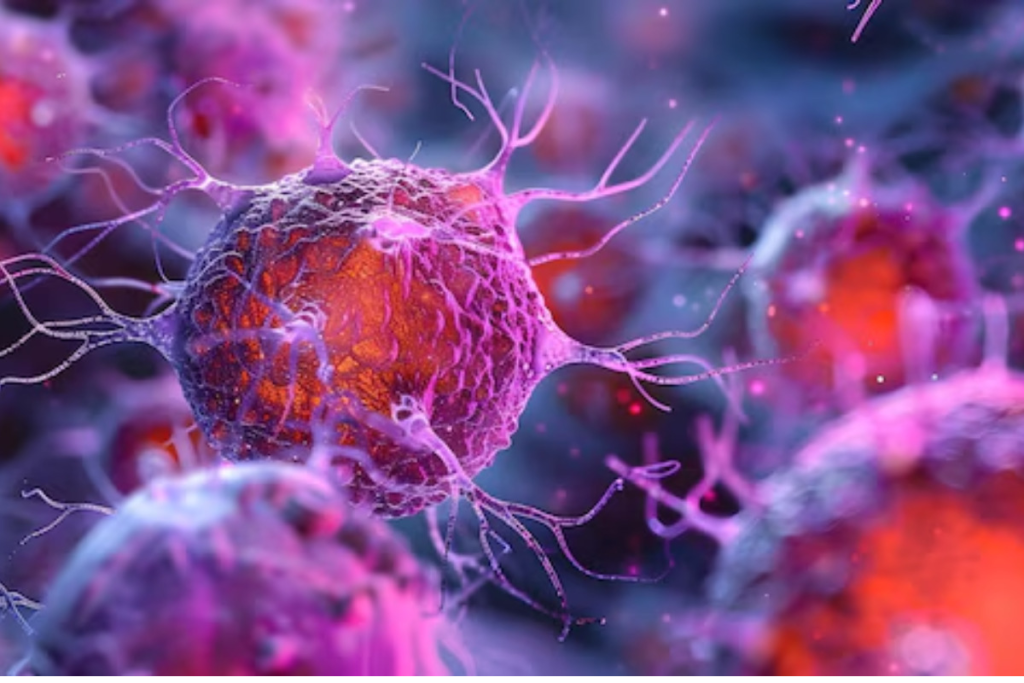Last Updated on October 20, 2025 by
Cancer treatment has changed a lot with targeted therapy. This new method targets specific changes in cancer cells.
Unlike old treatments, targeted cancer therapeutics don’t harm healthy cells as much. This makes treatments better and safer.

Many cancers are now being treated with this new method. It gives hope to patients with tumors that were hard to treat before.
Cancer treatment has changed a lot with targeted therapy. It targets the genetic changes that cause cancer. This method is based on knowing how cancer works, so treatments can focus on the problem.
Targeted therapy is different from old chemotherapy. It tries to hurt only the cancer cells, not the healthy ones. Targeted therapies do this by looking for specific genetic changes in cancer cells.
Studies show that targeted therapy works well for some cancers. For example, it’s good for non-small cell lung cancer (NSCLC) with EGFR or ALK mutations. This method is making treatments better.
Targeted therapies find and attack specific changes in cancer cells. This helps protect healthy cells. It’s a big step up from old chemotherapy, which can hurt more.
| Therapy Type | Mechanism of Action | Effect on Healthy Tissues |
|---|---|---|
| Targeted Therapy | Targets specific genetic mutations or alterations in cancer cells | Minimizes damage |
| Traditional Chemotherapy | Affects rapidly dividing cells, both cancerous and healthy | Can cause significant damage |

Understanding targeted therapy shows it’s a better way to treat cancer. It’s more precise and can be less harmful. This is true for cancers like NSCLC with certain mutations.
Certain cancers respond well to targeted therapy because of their genes. This method is more precise than traditional chemotherapy. It’s a key treatment for many cancers.
Some cancers, like non-small cell lung cancer (NSCLC) with EGFR or ALK mutations, respond well to targeted therapy. HER2-positive breast cancer, chronic myelogenous leukemia (CML), and colorectal cancer with RAS/BRAF mutations also do. These cancers have specific genetic changes that targeted therapies can target.
Choosing treatments based on biomarkers is key in targeted therapy. Doctors look at a tumor’s molecular makeup to pick the best therapy. This makes treatments more effective and reduces side effects.
| Cancer Type | Targetable Mutation | Targeted Therapy |
|---|---|---|
| Non-Small Cell Lung Cancer (NSCLC) | EGFR Mutation | EGFR Inhibitors |
| HER2-Positive Breast Cancer | HER2 Amplification | HER2-Targeted Agents |
| Chronic Myelogenous Leukemia (CML) | BCR-ABL Fusion | BCR-ABL Tyrosine Kinase Inhibitors |
The table shows some cancers that respond to targeted therapy, along with the mutations and treatments. This approach is changing how we treat cancer.
Targeted therapies have greatly improved NSCLC treatment, leading to better patient outcomes. NSCLC is a common lung cancer type. It has seen big improvements thanks to targeted therapies.

Therapies targeting the EGFR mutation have greatly helped patients with EGFR mutation-positive NSCLC. EGFR tyrosine kinase inhibitors (TKIs) are key in treating this type of NSCLC. They offer better survival rates and response rates than traditional chemotherapy.
“The introduction of EGFR TKIs has revolutionized the treatment of NSCLC, providing a more personalized approach to cancer therapy,” as noted by a leading oncologist.
Patients with ALK rearrangements benefit from targeted treatments that block the ALK protein. ALK inhibitors have shown great results in treating ALK-positive NSCLC. Some patients have had long-lasting responses.
The creation of KRAS inhibitors is a major breakthrough in treating NSCLC and pancreatic cancer. KRAS G12C inhibitors have shown great results in trials. They offer a new hope for patients with this specific mutation.
In 2025, the FDA approved new KRAS inhibitors for hard-to-treat mutations in NSCLC and pancreatic cancers. This is a big step forward for these ‘undruggable’ targets.
HER2-positive breast cancer is a tough form of breast cancer. It happens when there’s too much of the HER2 protein. Thanks to targeted therapies, there’s new hope for those affected.
HER2-targeted agents have made a big difference. Trastuzumab was the first to be approved by the FDA. Now, we have pertuzumab and ado-trastuzumab emtansine too. These newer options are safer and more effective.
Research keeps going to find even better treatments. This could lead to even better results for patients.
Using HER2-targeted agents with chemotherapy is very promising. It attacks cancer cells more powerfully. Studies show it can help patients live longer and reduce the chance of cancer coming back.
New PI3K inhibitors and CDK4/6 inhibitors are being explored. They might help when used with other treatments. Research is looking into how to best use these in treatment plans.
As we learn more about HER2-positive breast cancer, we’ll see more advanced treatments. This could greatly improve life for those with this disease.
Targeted therapies have changed how we treat blood cancers. They offer more precise and effective treatments.
These therapies target specific molecular mechanisms in blood cancers like leukemia and lymphoma. This approach has led to big improvements in treatment.
Chronic myelogenous leukemia (CML) treatment has seen a huge leap forward. BCR-ABL tyrosine kinase inhibitors have greatly improved patient outcomes. These drugs target the BCR-ABL fusion protein, a key factor in CML.
BCR-ABL tyrosine kinase inhibitors, like imatinib, dasatinib, and nilotinib, are key in CML treatment. They block the tyrosine kinase activity of the BCR-ABL protein. This stops the growth of leukemic cells.
Thanks to these inhibitors, CML is now a manageable condition for many patients. It’s no longer a fatal disease.
Other blood cancers also benefit from targeted therapy. For example, some lymphomas are treated with drugs targeting specific molecular changes. Targeted therapies are more precise, harming fewer healthy cells and causing fewer side effects.
The treatment of blood cancers is constantly evolving. Ongoing research aims to find new targets and strategies. As we learn more about these diseases, we can develop better and less harmful treatments.
Colorectal cancer treatment has seen big steps forward with new targeted therapies. These are key for tumors with RAS and BRAF mutations. Targeting these genetic changes is now a main part of treating this cancer.
For those with RAS wild-type colorectal tumors, anti-EGFR antibodies are a big help. Cetuximab and panitumumab are two such agents that help improve outcomes. They work by blocking the EGFR, slowing tumor growth, and boosting survival chances.
Using these antibodies depends on RAS mutations. Tumors with these mutations don’t respond as well. So, choosing the right treatment based on biomarkers is key.
BRAF mutations, like the V600E, are found in some colorectal cancers and are linked to a worse prognosis. BRAF inhibitors like vemurafenib and encorafenib show promise when paired with other drugs. These combos aim to beat resistance and achieve better treatment results.
“The mix of BRAF and EGFR inhibitors has shown great results in patients with BRAF V600E-mutant colorectal cancer. It offers a new hope for this tough group of patients.”
Other genetic changes are being looked at as targets in metastatic colorectal cancer. HER2 amplification, TRK fusions, and other rare genetic changes are in the spotlight. New therapies targeting these are being tested in clinical trials.
The field of colorectal cancer treatment is always changing with new targeted therapies. As we learn more about the disease, we can make treatments more effective and tailored to each patient.
The treatment for pancreatic cancer is changing with new targeted therapies. This cancer is aggressive and hard to treat. But new treatments are giving hope for better care.
The creation of KRAS G12C inhibitors is a big step forward. These drugs target a specific mutation in pancreatic cancer. They have shown great promise in trials, helping patients with this mutation.
Researchers are looking at combination strategies to make KRAS G12C inhibitors even better. They want to use these drugs with other treatments. This could help patients more and fight resistance.
Clinical trials are testing KRAS G12C inhibitors alone and with other treatments. These trials are key to understanding their full power. As research goes on, the outlook for pancreatic cancer treatment is getting brighter.
In the last ten years, small-molecule targeted therapies have greatly changed how we treat solid tumors. These treatments aim at specific changes in cancer cells that make them grow. They offer a more focused approach than traditional chemotherapy.
Today, over 50 targeted agents are approved by the FDA for solid tumors. These agents help by targeting specific genetic changes in tumors. This leads to better treatment results for patients.
With so many options, doctors can tailor treatments to fit each patient’s needs. This makes care more personalized and effective.
These targeted therapies work in different ways. Some focus on specific kinases that help tumors grow. Others target pathways that help cancer cells survive. Knowing how they work helps doctors choose the best treatment for each patient.
By grouping these agents by how they work, doctors can better understand and use them. This helps in making treatment choices and developing new treatments. It also moves precision medicine forward.
Precision medicine has changed how we treat rare and complex cancers. It targets specific genetic changes in cancers like GIST and thyroid cancer. This makes treatment more effective.
GIST is a rare cancer found in the digestive tract’s connective tissue. Thanks to targeted therapies like imatinib, treatment for GIST has greatly improved.
Thyroid cancer, including medullary and differentiated types, has seen new treatments. Drugs like vandetanib and cabozantinib are now approved for advanced medullary thyroid cancer.
The FDA now approves treatments based on genetic changes, not just where the tumor starts. This is good news for rare cancers with specific genetic mutations.
| Cancer Type | Targeted Therapy | Genetic Alteration |
|---|---|---|
| GIST | Imatinib | KIT mutation |
| Medullary Thyroid Cancer | Vandetanib, Cabozantinib | RET mutation |
| Various Cancers | Entrectinib, Larotrectinib | NTRK fusion |
The treatment of rare cancers is changing fast with precision medicine. As research grows, we can expect more targeted treatments. This brings hope to those with these complex diseases.
New technologies are changing targeted therapy, making treatments more personal and effective. These innovations are reshaping how we diagnose and treat cancer. They bring hope to patients all over the world.
Spatial transcriptomics is a new way to study the tumor microenvironment. It helps researchers understand how different parts of the tumor work together. This knowledge is key to finding new targets for treatment.
This technology is great for tackling the complexity of tumors. It helps find ways to beat treatment resistance.
Artificial intelligence (AI) is now helping pick the right targeted therapies. AI looks at lots of data, like genes and medical history. It suggests the best treatments for each patient.
This approach makes treatments more effective. It also improves how well patients do.
Liquid biopsy checks the blood for tumor DNA. It’s a non-invasive way to watch how treatments are working. It spots when treatments stop working and suggests changes.
This method makes treatments better by adjusting them as needed. It’s a big step forward in fighting cancer.
Using these advanced technologies in medicine is making targeted therapy even better. It’s opening up new ways to help patients win their battle against cancer.
The future of cancer treatment is set to change a lot with new advances in targeted therapy. As we learn more about cancer’s molecular biology, we’re finding new ways to target cancer cells. This means treatments can be more precise and effective.
Advanced technologies like artificial intelligence and liquid biopsy will be key in this change. They will help make treatments more personalized and better for patients. This could lead to even better results for those fighting cancer.
With new therapies and technologies, the outlook for cancer treatment is bright. Targeted therapy will likely continue to be a major part of treatment. It offers patients treatments that are more effective and tailored to their needs.
Targeted therapy is a cancer treatment that targets specific changes in cancer cells. It aims to harm these cells less than traditional chemotherapy. This method is more precise, focusing on cancer cells alone.
Targeted therapy is often used for non-small cell lung cancer (NSCLC) with EGFR or ALK mutations. It’s also used for HER2-positive breast cancer, chronic myelogenous leukemia (CML), and colorectal cancer with RAS/BRAF mutations.
Targeted therapies work by focusing on specific changes in cancer cells. This reduces harm to healthy tissues, making treatment safer and more effective.
Biomarkers are key in targeted therapy. They help doctors choose the right treatment for a patient. This is based on the tumor’s molecular characteristics.
For NSCLC, EGFR inhibitors are used. HER2-targeted agents treat HER2-positive breast cancer. BCR-ABL tyrosine kinase inhibitors are for CML. Anti-EGFR antibodies are used for RAS wild-type colorectal cancer.
Advances in targeted therapy have greatly improved cancer treatment. They offer more precise and effective treatments. These target specific molecular changes in cancer cells.
KRAS G12C inhibitors are a breakthrough in pancreatic cancer treatment. They target the KRAS G12C mutation in some patients. This has shown great promise in treating this disease.
Advanced technologies like artificial intelligence and liquid biopsy are improving targeted therapy. They help choose treatments, monitor responses, and detect disease progression. This makes targeted therapy more effective.
Subscribe to our e-newsletter to stay informed about the latest innovations in the world of health and exclusive offers!